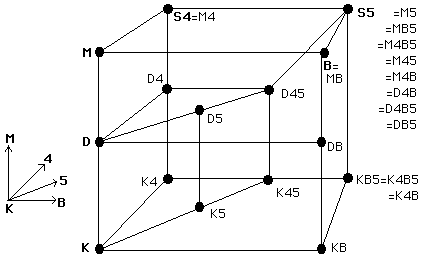Hi folks. I had a couple of questions regarding question 2 of our homework assignment. I count three arguments. The first is that GR cannot give an account of truth-makers for every modal claim; specifically, for de re modal claims about non-actual possible individuals. (52-53)
The second is the modal objection/problem of non-contingency on 54-55. The third is the claim that, given certain background assumptions, GR cannot provide an account of the relation between truth and truth-maker that captures what Divers calls "correct matching."(56)
The first two seem important for the homework question. The third one....not so much. Does this seem right to you guys? Does anyone identify additional relevant arguments?
Thanks
Sunday, June 3, 2007
Subscribe to:
Post Comments (Atom)

1 comment:
I took there to be 3(ish) arguments for truthmakers. Sadly they are somewhat different than yours. First, de dicto or 'corresponding individuals' objection, de re Counterpart objection, and the Non-contingency objection (which I think the 'matching' section from Divers includes). Below, I've posted my response for the de dicto objections. I'll post up the rest later. N.B. I could be wholly wrong about the break-up of the arguments, so any other folks input would be great.
2.
Truthmaker Principle:
The proposition, φ, is true iff there is something, x, that necessarily exists in reality.
The 'corresponding individual' Objections:
de dicto impossibility claims:
(1) The proposition, (e.g. it is impossible that there is something that is both uniformly red and uniformly green), is true.
(2) But, there is not something, (e.g. red and green individuals or impossible worlds), that necessarily exists in reality.
(3) Therefore, the proposition, φ, is true iff there is something, x, that necessarily exists in reality, is false.
de dicto non-actual individual claims:
(1) The proposition, (e.g. Brownie might have existed), is true.
(2) But, there is something, (e.g. Brownie), that necessarily does not exist in reality.
(3) Therefore, the proposition, φ, is true iff there is something, x, that necessarily exists in reality, is false.
As per my usual m.o., with regards to argument analysis, is to over complicate things (whatever!)... I chose to parse the 'corresponding individuals' objection into two parts. Though both claim the right-hand of the truthmakers biconditional to be false, there seems to be a distinct difference as to why.
In the first case for de dicto impossibility claims, the emphasis is placed on there not being something, x, whereas in the second case for de dicto non-actual individual claims, the emphasis is placed on there not existing something, x. Now I know most of you will cringe at my distinction between not being versus not existing, but there seems to be a difference when figuring out what the truthmaker needs to point to. The first case is purely de dicto. When the proposition, “it is impossible that there is something that is both uniformly red and uniformly green”, is analyzed in terms of the truthmaker principle, the key is to find out the truth of what is said and try to point to, as it were, what the proposition is true in virtue of. But, it is impossible that there is something. Regardless of whether it is red, green, black, pink or rainbow coloured uniformly, search as much as you like, at any world that you like. The point is that it is impossible to do. The of what the proposition says is impossible.
In the second case, the best way I can explain the distinction is that there is a de re claim inside of a de dicto claim (if there is such a thing. A Priestly, Nescio, Cain, Hooded Man refresher might be in order here if I'm not mistaken...). In order to point to the of what is said for the proposition, the truthmaker needs to point to the of the thing first. The truthmaker is trying to point to something of the thing. Which it cannot do because it does not exist. Something de re (i.e. existence) about the individual cannot be pointed to.
In either case and agreeing with Divers, the GR + truthmaker account has difficulties about the truth for de dicto propositions. In reference to the Armstrong distinctions between truthmaker necessitarianism and maximalism, the first case definitely violates the necessiatrianism position in that there is no absolute necessary relation between the truthmaker and the truth it is supposed to necessitate, because the relation is impossible. In the second case, it is the maximalism position that is violated because the truth has no truthmaker, there is no existing thing.
Post a Comment